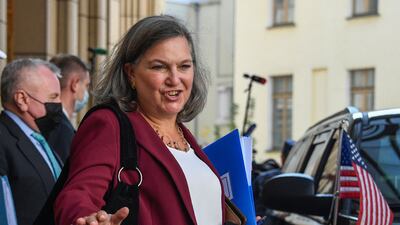US engagement in the Middle East peace process was revitalised this week, as Under Secretary of State for Political Affairs Victoria Nuland met senior officials in Israel and the Palestinian territories.
Ms Nuland met Palestinian Authority President Mahmoud Abbas in Ramallah on Monday and described the talks as a “productive discussion on the renewed US relationship with Palestinians, respect for human rights and democracy and support for a two-state solution”.
Mr Abbas said Israel must stop unilateral measures that undermine the two-state solution.
The under secretary was the second high-profile US official to meet Mr Abbas in less than six months.
Last May, Secretary of State Antony Blinken met Mr Abbas in Ramallah after an outbreak of violence between Israeli forces and Palestinian militant groups. The visit was seen as an early test for the administration of US President Joe Biden and its diplomatic approach to the decades-long conflict.
Mr Biden has often said that he wants both sides to repair relations that have deteriorated since the last round of direct peace talks collapsed in 2014.
While the US has long sought a solution to the conflict that will result in a viable Palestinian state, the Donald Trump administration made some moves that critics saw as hindering the peace process, including recognising Jerusalem as Israel's capital.

Despite the apparent diplomacy drive, experts remain sceptical about the scope of US re-engagement with the Middle East peace process.
Seth Frantzman, executive director of the Middle East Centre for Reporting and Analysis, said the Biden administration has tried to make clear to both sides that it supports a return to the status quo that existed before the Trump administration's policy changes.
“US officials offer up vague statements about peace and a two-state solution, statements designed not to ruffle feathers among the Israeli or Palestinian leadership,” he told The National.
“The US does not appear to be focused too strongly on floating new peace deals or condemning Israel's policies because the Biden administration has many other priorities such as dealing with Russia-Ukraine tension, China, the Iran talks in Vienna and an ongoing pandemic.”
Under Mr Trump, diplomatic efforts to resolve the Palestinian-Israeli conflict were largely seen by Palestinian officials as ineffective and doing more harm than good to their cause.
Palestinians have dismissed Mr Trump’s peace plan — hailed as “the deal of the century” by its backers — as an economic blueprint that recycled old ideas for the West Bank and the Gaza Strip.
Mr Abbas rejected the deal, which was orchestrated by Mr Trump’s son-in-law, Jared Kushner.
“No, no and no to the ‘deal of the century,'” he said in June 2020. “Jerusalem is not for sale. All of our rights are not for sale or bartering. This plan will go to the dustbin of history.”

Though the US embassy remains in Jerusalem, Mr Biden has undone some of his predecessor's policies.
In April, Mr Biden reversed Mr Trump’s suspension of aid to the UN Relief and Works Agency (UNRWA), which has helped Palestinians for seven decades, and on Tuesday, Palestinian and US officials met virtually for their first economic dialogue in five years.
Last year, revenue collected by the Palestinian Authority from trade, tourism and transfers had declined to their lowest levels in 20 years, partly due to the coronavirus pandemic.
The Palestinian refugees and their right of return and the status of Jerusalem as well as borders and security arrangements are only some of the sticking points in the drawn-out effort to find a solution to the conflict.
Despite the challenge, there have been signs that relations between Israel and the Palestinians are improving.
Mr Abbas held talks with Israeli Defence Minister Benny Gantz in August — the first meeting between the Palestinian leader and a senior Israeli official in more than a decade.
Mr Frantzman said however that a long-sought breakthrough may prove elusive.
“Although there may be incremental positive steps, such as shoring up the Palestinian economy, the chances of a breakthrough appear slim because the Palestinian leadership in the West Bank won't reconcile with the Hamas leadership in Gaza,” he said.
“Israel also prefers the status quo because it knows that its current ruling coalition is very fragile and consists of too many parties across the political spectrum and would not be able to agree on any controversial decisions or concessions to the Palestinians,” he added.

Senior Israeli officials, including Interior Minister Ayelet Shaked, oppose the concept of a Palestinian state.
Ms Shaked, who is one of Israel's most influential politicians and a linchpin in the current government, told The National in October that Israel wanted to manage the conflict with the Palestinians, not resolve it.
Experts believe that the Biden administration’s focus on other parts of the world could allow Russia and China to play a more prominent role in the Middle East.
“Moscow and Beijing may consider US inaction on the issue — or the seemingly slow US response — and its general inclination to focus on other parts of the world (or domestically) as an opportunity to exert greater influence on bringing about a negotiated settlement,” said Richard LeBaron, a non-resident senior fellow at the Atlantic Council.
China reportedly offered in March to mediate between the Israelis and the Palestinians, even though it has no historical connection to the conflict.
And in May, Russian Foreign Minister Sergey Lavrov reiterated Moscow’s support for talks to resolve key pending issues between both sides.


